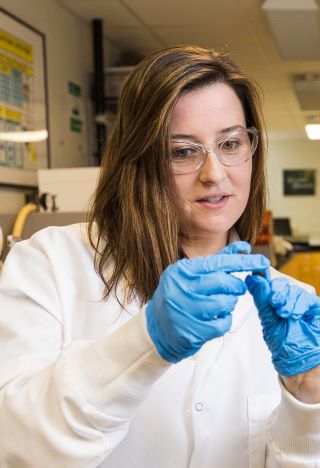Melissa Gordon ’11, assistant professor of chemical and biomolecular engineering, was recently awarded a grant from the American Chemical Society (ACS) to provide research opportunities for students.
The two-year, $55,000 Undergraduate New Investigator grant will primarily provide several students with a mentored, hands-on research opportunity at Lafayette focused on developing and testing stimuli-responsive polymers.

Melissa Gordon, assistant professor of chemical and biomolecular engineering
These “smart” materials exhibit desirable property changes in response to environmental cues. This work will specifically look at using carbon dioxide as a responsive trigger in water-filled polymers similar to those used in contact lenses, Gordon says, adding that the results from these studies may be valuable in the fields of drug delivery and microfluidics.
“The grant will also generously support the chemicals and supplies needed for this research as well as partially fund travel to scientific meetings,” she says. “I am excited for this opportunity and am very grateful to the American Chemical Society for its support early in my career.”
Gordon hopes that creating new “smart” materials will inspire students to pursue this field further in their careers.
“Some preliminary data was collected with the help of Jimmy Hastie ’22, Cameron Cranley ’20, and Sarah Burkert ’21, and I look forward to continuing this work with the support of ACS,” she says. “The research I did as a student at Lafayette greatly influenced my career path, and this funding will help me pay it forward to others.
“My initial reaction to receiving this grant was one of surprise and excitement,” Gordon notes. “I feel like everyone could use a win in 2020, and I am grateful to have one.”
The ACS previously recognized Gordon with an Excellence in Graduate Polymer Research award at its annual meeting in 2016 for her dissertation work developing a self-healing material.
“I’m grateful for their continued support,” she says.
Read more about the award.
Read more about Melissa Gordon’s research.
